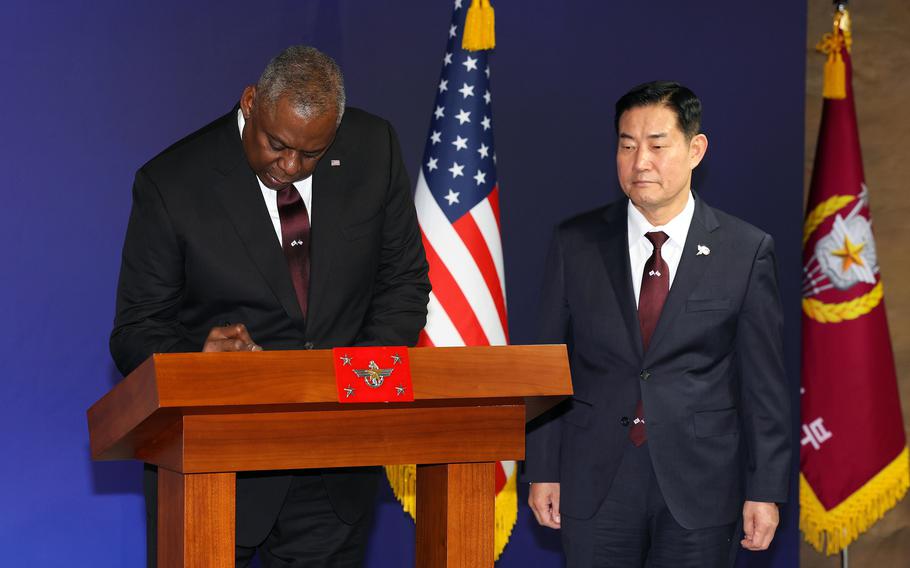
Secretary of Defense Lloyd Austin poses with South Korean Defense Minister Shin Won-sik at the Ministry of National Defense headquarters in Seoul, South Korea, Monday, Nov. 13, 2023. (South Korea’s Ministry of National Defense)
The top military leaders for the United States and South Korea reaffirmed their alliance Monday and pledged to expand the scope of their military partnership with allies in the face of North Korea’s ballistic missile tests.
Defense Secretary Lloyd Austin and Defense Minister Shin Won-sik met Monday in Seoul for the 55th Security Consultative Meeting, an annual conference between senior U.S. and South Korean defense officials to discuss the state and future of their alliance.
Austin arrived Saturday in South Korea as part of a broader trip to the Indo-Pacific to reaffirm the U.S. defense commitment to the region. He leaves for Indonesia on Tuesday.
“I’m proud to say that our alliance is stronger than ever,” Austin said at a press conference with Shin at the Ministry of National Defense headquarters following their meeting.
The U.S. commitment to South Korea’s defense remains ironclad and includes “the full range of our nuclear, conventional and missile defense capabilities,” Austin added.
Shin said Seoul’s “comprehensive strategic alliance” with Washington will bring about “peace, stability and prosperity of not only the Korean Peninsula, but the world.”

Secretary of Defense Lloyd Austin signs a guestbook at the Ministry of National Defense headquarters ahead of his meeting with Defense Minister Shin Won-sik, right, in Seoul, South Korea, Monday, Nov. 13, 2023. (South Korea’s Ministry of National Defense)
The two defense leaders agreed to expand the scale of their joint military exercises to include Japanese and U.N. Command troops and update a decade-old bilateral security agreement designed to counter North Korea’s nuclear ambitions, Shin said.
On Sunday, Austin and Shin held a video conference with Japanese Defense Minister Minoru Kihara. The three leaders agreed to plan for trilateral military drills next year and affirmed that a real-time missile data-sharing system would be operational next month, according to a news release from Seoul’s military the same day.
U.S.-South Korean exercises have already expanded beyond the two countries’ militaries this year.
On Oct. 22, the U.S., South Korean and Japanese militaries carried out their first-ever aerial drills south of the Korean Peninsula.
Two U.S. Air Force F-16 Fighting Falcons, two South Korean F-15K Slam Eagles and two Japanese F-2s flew alongside each other while escorting a U.S. B-52H Stratofortress nuclear-capable bomber. The bomber touched down in South Korea five days earlier, marking the first time in at least 30 years that a B-52 landed in the country.
This year’s Ssangyong exercise in South Korea, the largest joint maritime drill in the country since 2018, included 30 British marines who conducted reconnaissance operations for the first time.
“We can never accept a nuclear attack by North Korea,” Shin said. “And if it does use nuclear weapons, North Korea will face an immediate, overwhelming and decisive response from [South Korea] and U.S., which will lead to the end of the Kim regime.”
Austin’s meeting with Shin comes nearly 12 weeks after a ballistic missile launched by North Korea failed to put a satellite into orbit. The communist regime last fired two short-range ballistic missiles off its eastern coast Sept. 13, for a total of 21 ballistic missiles in 14 days of testing so far this year.
Two days prior to Austin’s arrival, North Korea’s state-run news agency issued a report criticizing his upcoming visit and said it would “bring about a new war cloud in the Asia-Pacific region.”